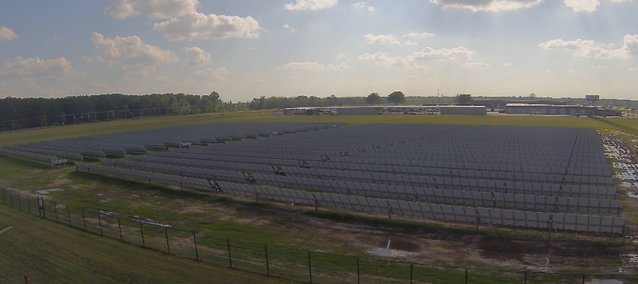Bill Halter and L’Oréal are counting on the sun
by April 20, 2017 5:36 pm 955 views

Photo courtesy of L’Oréal USA.
For former Arkansas Lt. Governor Bill Halter and his corporate partner, L’Oréal USA, they’ve planted a field of beams.
On Thursday, Halter’s solar panel company Scenic Hill Solar and cosmetics giant L’Oréal officially opened a solar panel project that will help power the North Little Rock manufacturing plant.
The 3,528 solar panels were installed earlier this year and will provide 1.2 MW of renewable energy to the factory that is expected to reduce carbon emissions by 556 metric tons per year. It is the fourth largest solar project in Arkansas and more could be on the way.
“Solar power is absolutely the wave of the future for electricity production,” Halter said. “It’s become economic to do so, it provides the client with a cost reduction for their electricity, but also predictability of their electricity prices for the next 30 years. And of course, there’s the environmental benefit as well.”
For L’Oréal, North Little Rock manufacturing plant manager Eric Fox said it helps his operation meet the company’s goal of having a zero carbon footprint.
“It’s part of a global commitment that we have toward sustainability. And one target for each of our locations worldwide is to work toward manufacturing and distribution centers that are carbon-neutral,” Fox said. “So for us, here in Arkansas, what made the most sense was solar.”
Combined with hydro power credits from the Murray Dam, Fox said that 100% of the electrical power fueling his factory is through renewable energy – a goal that he hoped to obtain by the year 2020.
L’Oréal acquired the North Little Rock plant from Maybelline in 1996, but the site has been in existence since 1975. It is the fourth largest industrial employer in central Arkansas with nearly 500 workers.
Fox says there are other sustainability projects that are underway at L’Oréal.
“We currently have two other pretty significant sustainability initiatives. One is collection of rainwater from our rooftop that’s going to be housed in an on-site storage and be used for all external irrigation, which is about 200,000 gallons a year of water saved,” Fox said.
The other project is an on-site bio-composting unit that will collect organic food and other waste and recycle it for mulch for local farmers.
“It can be given away to local farmers,” he said. “You can imagine the folks at the River Market or locally could come here and get free compost for use in their own gardens. We’ll create a circular economy out of what was otherwise organic food waste.”
Halter says solar power is a viable and growing source of energy and he expects more projects in and out of state. He has one similar project underway in Kentucky and says more are planned in Arkansas.
“We do have a number of conversations underway with folks at different companies and organizations, and we’re confident that this is the wave of the future for the state,” Halter said.
Solar power is advancing like computer chip technology evolved in recent years. Every several months, scientists and developers are finding ways to make it more efficient and powerful, while reducing costs in the finished products.
“The underlying trend is that the cost of producing the equipment has gone down, the familiarity with installs by construction workers has gone up, and the productivity and efficiency of the equipment is also simultaneously going up,” Halter added.
Beyond Halter’s and L’Oréal’s efforts, Arkansas energy firms have also made significant investments in solar power, including the Electric Cooperatives of Arkansas and Entergy Corp. Any chance to build or invest in alternative energy that can relieve the stress of existing power plants reduces the need to build new large-scale infrastructure to generate power – often an expensive billion-dollar proposition ripe with regulatory and environmental hurdles.
John Bethel, executive director at the Arkansas Public Service Commission, was in attendance at the L’Oréal ribbon cutting. The PSC currently has an open docket as state regulators contemplate how to create rules for the state’s burgeoning renewable energy sector.
“The net metering proceeding is really going along in two phases. The first phase is modifying the rules that govern how those facilities will interact with the utility. The second phase is looking at the rates that net metering customers will be charged and will pay,” said Bethel.
State law requires that utilities recover their cost of service from serving customers. Bethel said the PSC is looking at what changes may need to be made to existing rates and rate structures. He expects more action in September of this year with a possible hearing in late 2017 and likely final decision in early 2018.
